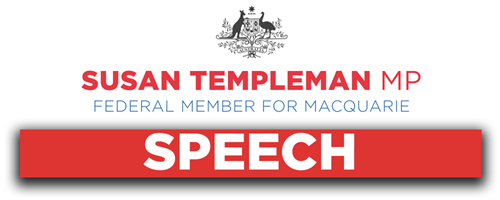
It's been a real privilege to hear the last two speakers talk about their very affectionate memories of Simon Crean. He certainly leaves a formidable legacy. I first encountered him as a young journalist here in Canberra, in the press gallery, when he was with the ACTU in the 1980s. We'd doorstop him on the way into meetings and we'd record the results on the way out, usually on the front steps of the old parliament. And these were the comings and goings of negotiating multiple rounds of the Prices and Incomes Accord with the then Hawke government, with Hawke and Paul Keating.
When I look back on these times, I didn't have the relationship that the member for Riverina had or the member for Gorton had, but I look back and think of what I was watching happening before me, and that was seeing Simon Crean and Storemen and Packers Union that he'd come from being pioneers in negotiating a superannuation system which really set the scene for what became a cornerstone of our superannuation system that we have today. The accord mark II, which I remember reporting on, really paved the way for that compulsory superannuation system. So I had the privilege of watching him change Australia.
I think much has been said about his principled decision to oppose the Howard government's decision to go to
war in Iraq and how he articulated so clearly to the troops that his beef was not with them but was with the
government. That has been much remarked on since his very sad passing. But I want to talk about his arts legacy that he leaves. As the member for Gorton referred to, that was something that probably hasn't had as much light shone on it over many, many years, but we've made sure that that legacy is being well remembered. It was a real testament to his forward thinking that, 10 years on, the vision that he offered for a cultural policy, Creative Australia, served as the foundation for the new cultural policy that we've released: Revive. In many ways he was the grandfather of that policy, never content for the arts to be left to the margins. In 2013, he said:
"… governments have to invest in our culture and our creative industries. Why?—because culture defines us. We are home to the oldest living culture on earth, and we have been welcoming to the greatest diversity of cultures on earth. This is what has made us unique, and it is why we have to preserve it, nurture it, invest in it and build upon it."
I'm very pleased to speak in continuation. Having heard some terrific stories about Simon Crean and his relationships with people on both sides of this parliament through his many years as a minister, I want to focus on the role that Simon Crean had in the arts. He really helped redefine how we talk about the arts and how we value creativity. He believed in the value of art for art's sake, but he also understood the need to recognise the contribution that the arts can make to other areas of public policy, like education, health, innovation and employment. He made that argument with eloquence, rigor and passion. He spoke persuasively of the social and economic dividends that creativity pays to us, arguing that investing in the arts helped cement 'the values of inclusion and the values of respect' that are so essential to social harmony. He said that a creative nation is a productive nation, recognising that support for creative endeavour is an investment in our economic development and our capacity for innovation.
As Minister for the Arts, Simon brought not only thoughtful leadership but substantial new investment to the
arts. His policy introduced new support for digital gaming and live music. The Australia Council for the Arts
was modernised and given expanded responsibilities—and you can see there the things that we have built on
in our own cultural policy, Revive. We've taken the base that he set and we've progressed it further, given the
passage of time.
Simon Crean's tireless advocacy earned him the deep respect of the arts community. Nicholas Pickard of APRA
AMCOS recently reflected:
His mind, knowledge and energy was always ready to help, lean in and serve Australia's cultural future.
Australia's cultural future has been shaped in no small way by the intellect and dedication of Simon Findlay
Crean. I extend my deepest sympathies to his wife and family, to the many who loved him and to those who
admired him as a union leader, a Labor leader, an arts leader and a man who leaves an extraordinary legacy of public service.


